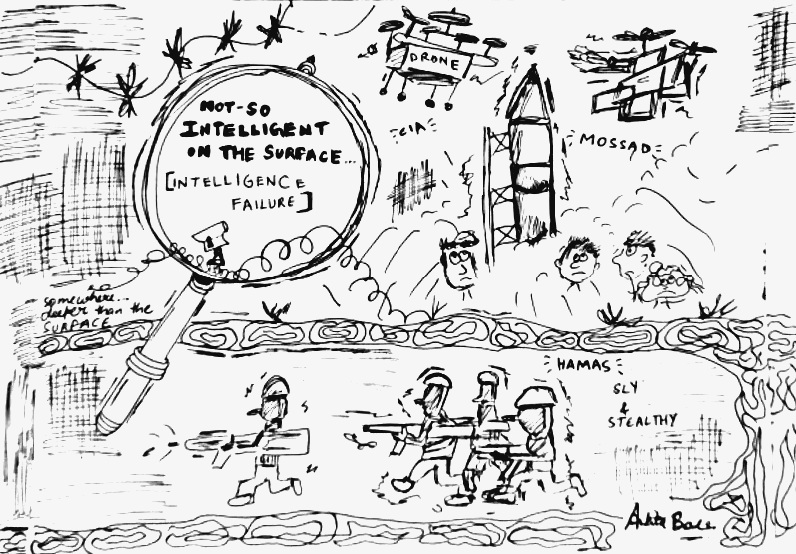By Pretish M J | November 17, 2023

Global intelligence agencies missing Hamas’ attack against Israel and the millions of dollars in procurement, planning, and execution for the attack is a collective security failure.
Hamas caught multiple national and international spy agencies, including Israel’s intelligence Mossad, unaware, leaving West Asia in conflict once again.
Exactly five decades after the 1973 Yom Kippur War, Hamas, which has adorned Palestine’s government since 2006, attacked Israel. Even if the religious overtones are set aside, this offensive attack must have had years of planning and movement of weapons under the watchful eyes of many security agencies, especially the Five Eyes intelligence-sharing network which includes USA’s Central Intelligence Agency (CIA). The question, then, is how did they miss this?
This is not the first time intelligence agencies have turned a blind eye towards conflict. The CIA and the Mossad had ample evidence of a conflict rising in 1973, but chose to ignore it because they did not think that Israel and the Arab Coalition could go to war, according to the CIA’s Center for the Study of Intelligence.
Israel has three intelligence agencies – Mossad, Amin (Military Intelligence), and Shin Bet (Internal Security). The Benjamin Netanyahu government increased Mossad and Shin Bet’s budget to $2.4 billion in 2018, and has been using its Pegasus spyware since 2011. To say the least, the chances of Mossad missing an attack were close to zero.
Proportionate Response?
Israel’s fightback has been violent, and it will be the same in the future. Now that both sides have violated the Geneva Conventions and raised countless questions on International Humanitarian as well as Economic Law, one fact will be remembered for years to come – Mossad failed.
We are faced with one question that Israel would long to answer, and one which the ever-conflicted state will strive to redact. The first is, “Is Hamas liable, or is Palestine and Gaza?” and the second is, “How did the world’s best intelligence agency not smell the gunpowder from afar?”
Preventing Attacks
An intelligence network is set up to keep tabs on national security threats. That is the department’s primary concern. It employs humans and technology to get the job done. Preventing an attack on your soil, however, comes down to predicting a supposed enemy’s pattern. It is a game of chess, where you plan three moves in advance, and defend your king.
The Hyderabad Artillery Centre had a running joke – the best time to invade India is 5 am, because every Indian soldier is using the facilities then. Indian security and intelligence agencies are prepared at all hours, there is no doubt. But what do you do when the attacker has no logic to their actions?
Hamas’ attack on Israel came without a shred of logic. The religious fanaticism that fuelled the attack had always been there, boiling under the surface, but never burst out before. What changed?
What’s Next?
Populations of West Asia and Europe are being wiped out as two wars continue simultaneously today. Tomorrow’s problems, however, could be different. It may mean more weapons, more soldiers and more spies. Overcompensating for intelligence failures may directly allow governments to tighten their grip over citizens. Better intelligence plans end up with huge defence budgets, and unfettered surveillance.
